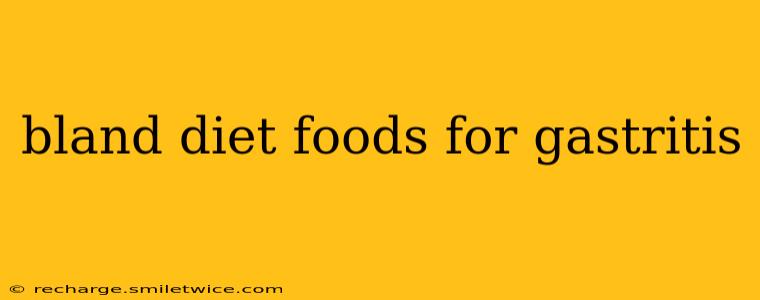Gastritis, the inflammation of your stomach lining, can cause significant discomfort, including pain, nausea, and bloating. A bland diet is often recommended to help reduce irritation and promote healing. This guide explores what a bland diet entails, provides a list of suitable foods, and addresses common questions surrounding this dietary approach.
What is a Bland Diet?
A bland diet emphasizes easily digestible foods that are low in fat, fiber, and acid. It avoids anything that might stimulate your stomach lining and worsen inflammation. This isn't a restrictive diet for life; it's a temporary strategy to help your stomach heal. Once your symptoms subside, you can gradually reintroduce other foods.
What Foods are Good for Gastritis?
The cornerstone of a bland diet consists of gentle, non-irritating foods. Here's a breakdown of food categories:
Low-Fat Proteins:
- Lean meats: Chicken breast (without skin), turkey breast, fish (like cod or flounder). Avoid red meat and fatty cuts.
- Eggs: Scrambled or poached (avoid fried).
- Tofu: A good source of plant-based protein.
Carbohydrates:
- Well-cooked grains: White rice, well-cooked pasta (avoid whole wheat initially), oatmeal (cooked until very soft).
- Starchy vegetables: Mashed potatoes (without butter or milk), well-cooked carrots, sweet potatoes (mashed).
- Bread: White bread (in moderation), toast (avoid whole wheat initially).
Fruits:
- Ripe bananas: Easy to digest and rich in potassium.
- Applesauce: Without added spices or sugar.
- Well-cooked pears: Soft and easy on the stomach. Avoid acidic fruits like oranges and grapefruit initially.
Dairy (in moderation):
- Plain yogurt (low-fat): Choose unsweetened varieties. Some people find dairy irritating, so monitor your reaction.
- Milk (in moderation): Whole milk might be too rich, so opt for low-fat or skim milk.
Other:
- Broth (low-sodium): Chicken or vegetable broth can help keep you hydrated and provide essential nutrients.
- Smoothies (made with bland ingredients): Use bland fruits like bananas and avoid acidic fruits.
Foods to Avoid on a Bland Diet for Gastritis
It's crucial to eliminate these foods during a flare-up:
- Fatty foods: Fried foods, greasy meats, processed meats, and rich sauces.
- Spicy foods: Chili peppers, hot sauces, and spicy seasonings.
- Acidic foods: Citrus fruits (oranges, lemons, grapefruit), tomatoes, and tomato-based products.
- High-fiber foods: Whole grains, nuts, seeds, and raw vegetables.
- Caffeine and alcohol: These can irritate the stomach lining.
- Carbonated beverages: These can cause gas and bloating.
- Processed foods: Often high in unhealthy fats, salt, and additives.
How Long Should I Follow a Bland Diet?
The duration of a bland diet depends on the severity of your gastritis and your response to treatment. Most people see improvement within a few days to a couple of weeks. Your doctor will advise you on how long to follow the diet. Once your symptoms improve, you can gradually introduce other foods back into your diet. Pay attention to how your stomach reacts to each new food.
Can I Eat Dairy on a Bland Diet for Gastritis?
Dairy can be tolerated by some individuals with gastritis, while others experience discomfort. If you decide to include dairy, opt for low-fat or fat-free options like plain yogurt (unsweetened) or low-fat milk. Start with small portions and monitor your symptoms. If you notice any negative reactions, eliminate dairy.
What are the Best Drinks for Gastritis?
Water is your best choice. You can also drink herbal teas (such as chamomile or ginger) in moderation. Avoid caffeinated beverages, carbonated drinks, and alcohol. Broths (low-sodium) can also be a good option.
What are Some Bland Diet Recipes for Gastritis?
Numerous simple recipes fit a bland diet. Focus on plain preparations like steamed chicken breast with plain rice, scrambled eggs with soft-cooked carrots, or creamy mashed potatoes. The key is to avoid any seasonings or ingredients that might irritate your stomach.
Remember, this information is for general knowledge and does not constitute medical advice. It's crucial to consult your doctor or a registered dietitian for personalized dietary recommendations based on your specific condition and health needs. They can help you create a bland diet plan tailored to your individual requirements and guide you through the process of safely reintroducing foods back into your diet.
